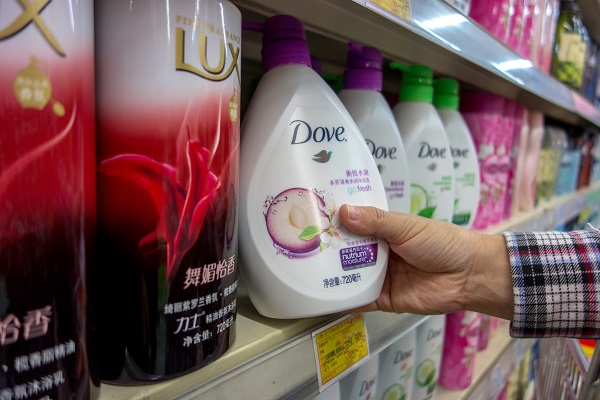Unilever dodges bullets to provide solid outlook
This trading statement has provided extra clarity for investors, and the preferred play in the sector is trading near a seven-month high. ii's head of markets rounds up the latest numbers.
24th April 2025 08:37
by Richard Hunter from interactive investor

Unilever (LSE:ULVR) has dodged the bullets which harmed Reckitt Benckiser Group (LSE:RKT) following its update yesterday, with a rather more solid outlook which gives investors additional clarity.
Similar themes are at play to the ones reported by Reckitt, but the direction of travel is rather different. On the one hand, there is inevitably some concern that the chances of an increasingly cost-conscious consumer switching to the cheaper, own-brand products of rivals, alongside a large decline in volumes, remains on the radar.
- Invest with ii: What is a Managed ISA? | Open a Managed ISA | Transfer an ISA
However, in stark contrast to Reckitt, Unilever’s own disposal is fully on track and the “Magnum Ice Cream Company” will be demerged in the final quarter of this year, listing like its current parent in Amsterdam, London and New York. The newly listed company, which also includes the household brands of Cornetto and Ben & Jerry’s in its portfolio, saw underlying sales growth of 4% and a 2.8% rise in revenues to €1.8 billion (£1.5 billion) in the quarter, boding well for its prospect as a standalone business.
At a group level, there was underlying sales growth of 3% for the period, ahead of the expected 2.8%, achieved through a mixture of improvements to both volume and price, which rose by 1.3% and 1.7% respectively. Within this number, the two largest units performed strongly, with Beauty and Wellbeing posting a gain of 4.1% and Personal Care 5.1%, driven in part by its relatively high margin products which have largely been able to fend off the threat of consumers trading down.
Indeed, the group’s own “Power brands”, which account for some 75% of revenues, also saw growth of 3%, with a particularly notable contribution from its Dove suite of products, where a rise of 8% underpinned the total. While there was some weakness in Home Care products and the Knorr brand, the likes of Magnum and Vaseline continued to show some resilience.
- Reckitt Benckiser prospects clouded by delayed sale of two businesses
- Three FTSE 100 shares return 20% in just two weeks
- Sign up to our free newsletter for investment ideas, latest news and award-winning analysis
By geography, the larger Emerging Markets region, which accounts for 58% of group revenues, grew by 2%, underpinned by a strong showing in India despite high interest rates in Latin America and a subdued Chinese market which provided headwinds.
The balance of 42% of revenues comes from the Developed Markets area, where growth of 4.5% was promisingly driven more by volume (3.3%) rather than price (1.2%) and where the overall number exceeded 4% for the third consecutive quarter.
At the same time, the group’s confidence in its transformation also saw an increase to the dividend, which now has a projected yield of 3.2%, while the €1.5 billion share buyback programme is nearing completion. The ultimate cost savings target of €800 million is also well on track, with €550 million having been achieved to date.
In terms of outlook, the group has maintained its projection of underlying sales growth of between 3% and 5% for the year, with a modest improvement to the underlying operating margin which was last reported at 18.4%, which in itself is a comfortable level.
Meanwhile, the shares have shaken off the surprise February announcement of a new CEO which caught investors on the hop at the time, but which has since been seen as a positive development towards the group’s aspirations of driving more focused growth.
- UK bank shares: Q1 2025 results review
- Eight key things to know about inheritance tax
- The ‘three Ps’ UK income investors need to own
For many, Unilever will continue to be seen as a solid defensive play and a core constituent of most portfolios. Its characteristics have come into their own amid an uncertain global economic environment, leading to a share price rise of 25% over the last year, as compared to a hike of 4.5% for the wider FTSE100.
While there are inevitably many similarities with its peer Reckitt Benckiser, there are also subtle differences which elevate Unilever to be the preferred play in this sector, with the market consensus of the shares as a cautious buy reflecting rather more visible growth and strategic prospects.
These articles are provided for information purposes only. Occasionally, an opinion about whether to buy or sell a specific investment may be provided by third parties. The content is not intended to be a personal recommendation to buy or sell any financial instrument or product, or to adopt any investment strategy as it is not provided based on an assessment of your investing knowledge and experience, your financial situation or your investment objectives. The value of your investments, and the income derived from them, may go down as well as up. You may not get back all the money that you invest. The investments referred to in this article may not be suitable for all investors, and if in doubt, an investor should seek advice from a qualified investment adviser.
Full performance can be found on the company or index summary page on the interactive investor website. Simply click on the company's or index name highlighted in the article.